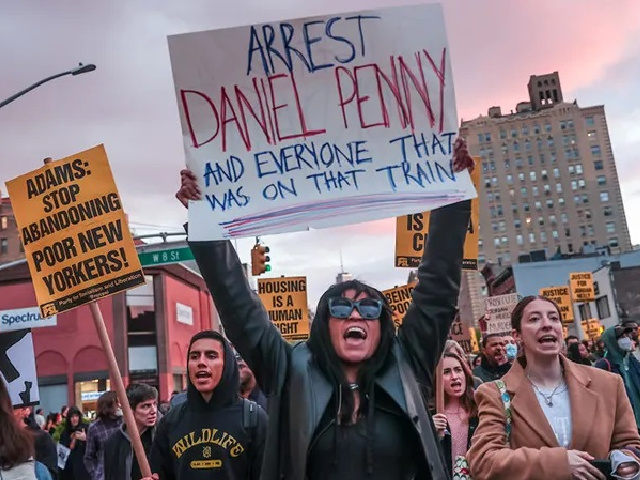Daniel Penny Manslaughter Charge Dismissed; Legal Debate over Lesser Charge; Jury to Return Monday
Daniel Penny, the 25-year-old former Marine who intervened on a New York City subway to restrain Jordan Neely after the latter began threatening passengers last year, will no longer face a manslaughter charge in Neely’s death.
Penny placed Neely in a chokehold for several minutes, then let go; he later died, though he was still alive when police arrived.
Penny was charged swiftly last year, partly because of racial politics: Neely, the initial aggressor, was both black and homeless. (His father has sued Penny in civil court.)

NEW YORK, UNITED STATES – May 5: Hundreds of demonstrators hold banners in New York City on Friday gather in Washington Square Park in New York, USA on May 5, 2023. Charges were called against the former U.S. Marine who choked a homeless man, Jordan Neely to death on the subway. (Photo by Selcuk Acar/Anadolu Agency via Getty Images)
However, many members of the public believe Penny was a Good Samaritan acting to defend fellow passengers, and New York City Mayor Eric Adams said Penny acted appropriately.
“You have someone [Penny] on that subway who was responding, doing what we should have done as a city,” he said.
The Manhattan jury could not reach a verdict after deliberating for several days, and even after receiving what is called an “Allen charge,” an instruction to reach a unanimous verdict of guilty or not guilty, if that is possible.
The defense wanted Judge Maxwell Wiley to declare a mistrial, but prosecutors moved that the manslaughter charge be dismissed instead, urging the judge to allow the jury to consider a “lesser included” charge of negligent homicide.
As PBS explained, under New York State law: “Manslaughter requires proving a defendant recklessly caused another person’s death, and carries up to 15 years. Criminally negligent homicide involves engaging in serious ‘blameworthy conduct’ while not perceiving such a risk, and carries punishments ranging from probation to up to four years in prison.” Typically, juries can consider such lesser charges when finding a defendant not guilty of the higher one.
However, the defense in the Penny trial objected, telling the judge that only a finding of “not guilty” on the charge of manslaughter would allow the jury to consider the lesser included charge, not merely a dismissal of the charge.
Judge Wiley admitted that there might be a legal problem. According to ABC News: “Wiley left unanswered the question about whether the jury could move onto the second count if they are unable to reach a verdict on the first count. He said he believed the jury moving to the second count is possible but needs to find the legal authority to do so.”
If the judge is satisfied that there is legal authority, the jury will deliberate on the lesser charge starting Monday. Defense lawyers are concerned that the jury could convict Penny on that charge as a consolation to the prosecution.
Joel B. Pollak is Senior Editor-at-Large at Breitbart News and the host of Breitbart News Sunday on Sirius XM Patriot on Sunday evenings from 7 p.m. to 10 p.m. ET (4 p.m. to 7 p.m. PT). He is the author of The Agenda: What Trump Should Do in His First 100 Days, available for pre-order on Amazon. He is also the author of The Trumpian Virtues: The Lessons and Legacy of Donald Trump’s Presidency, now available on Audible. He is a winner of the 2018 Robert Novak Journalism Alumni Fellowship. Follow him on Twitter at @joelpollak.





Comments are closed.